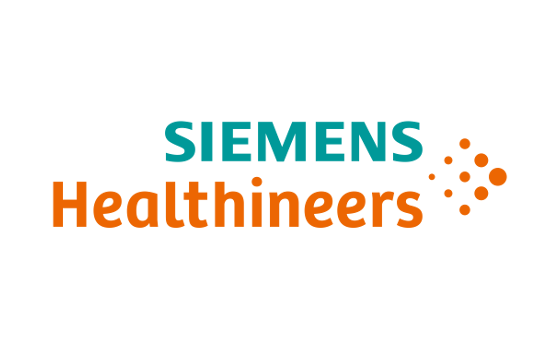 Through a year-long collaboration with a number of leading healthcare institutions across the globe, Siemens Healthineers has developed the Atellica COVID-19 Severity Algorithm,(1) a model designed to help predict the potential liklihood of progression to severe disease and life-threatening multiorgan dysfunction in COVID-19 patients. Leveraging deidentified COVID-19 patient data from more than 14,000 COVID-19 patients from multiple healthcare institutions worldwide, nine clinically significant lab parameters were identified and selected for inclusion in the algorithm. In addition to patient age, D-dimer, Lactate dehydrogenase (LDH), Lymphocyte %, Eosinophil %, Creatinine, C-reactive protein (CRP), Ferritin, PT-INR, and high-sensitivity Cardiac Troponin-I are used to help predict the likelihood of disease progression to severe disease endpoints.
Through a year-long collaboration with a number of leading healthcare institutions across the globe, Siemens Healthineers has developed the Atellica COVID-19 Severity Algorithm,(1) a model designed to help predict the potential liklihood of progression to severe disease and life-threatening multiorgan dysfunction in COVID-19 patients. Leveraging deidentified COVID-19 patient data from more than 14,000 COVID-19 patients from multiple healthcare institutions worldwide, nine clinically significant lab parameters were identified and selected for inclusion in the algorithm. In addition to patient age, D-dimer, Lactate dehydrogenase (LDH), Lymphocyte %, Eosinophil %, Creatinine, C-reactive protein (CRP), Ferritin, PT-INR, and high-sensitivity Cardiac Troponin-I are used to help predict the likelihood of disease progression to severe disease endpoints.
"We want healthcare providers to have access to a predictive tool that leverages our expertise in artificial intelligence and helps advance the understanding of how to improve patient care for those affected by COVID-19," said Deepak Nath, PhD, President of Laboratory Diagnostics, Siemens Healthineers. "With much of the world still in the throes of the pandemic, facing strict resource allocations, the ability to quickly identify patients at risk of progressing to severe disease in real-time could potentially assist in expediting triage. Early introduction of the most appropriate state-of-the-art treatments has been demonstrated to improve survival in high-risk patients."
The Educational Use Only algorithm is available for use on the company's website here. By entering a potential patient's lab values and age, the algorithm will generate a COVID-19 clinical severity score, including projected probability of progression to ventilator use, end-stage organ damage, and 30-day in-hospital mortality. The AI-based algorithm has been interfaced to the Atellica Data Manager software and is currently being evaluated as Investigational Use Only to help assess potential benefit to patient care. With integration into the existing physician order/sample processing/result reporting workflow, a later generation of the algorithm could provide clinical decision support capabilities to support standardized testing protocols for patients positive for COVID-19.
The company partnered with the Hospital Universitario of La Paz, Spain, to gather COVID-19 patient data to build the algorithm and later to test the accuracy of the tool via retrospective analysis. "The ability to leverage artificial intelligence to identify patients at high risk of adverse outcomes from a COVID-19 infection would be a major advancement in both clinical laboratory diagnostics and information technology," said Dr. Antonio Buño Soto, MD, PhD, Head of Laboratory Medicine Department, Hospital Universitario La Paz. "After seeing first-hand how seamlessly we were able to integrate the predictive model into our daily laboratory workflow with Atellica Data Manager, I'm confident the algorithm can become an integrated decision support tool that will expand the lab’s contribution to physicians, and ultimately aid in critical decision making for enhanced patient care."
About Siemens Healthineers AG
Siemens Healthineers AG (listed in Frankfurt, Germany: SHL) is shaping the future of healthcare. As a leading medical technology company headquartered in Erlangen, Germany, Siemens Healthineers enables healthcare providers worldwide through its regional companies to increase value by empowering them on their journey towards expanding precision medicine, transforming care delivery, improving the patient experience, and digitalizing healthcare. Siemens Healthineers is continuously developing its product and service portfolio, with AI-supported applications and digital offerings that play an increasingly important role in the next generation of medical technology. These new applications will enhance the company's foundation in in-vitro diagnostics, image-guided therapy, in-vivo diagnostics, and innovative cancer care. Siemens Healthineers also provides a range of services and solutions to enhance healthcare providers’ ability to provide high-quality, efficient care to patients. In fiscal 2020, which ended on September 30, 2020, Siemens Healthineers generated revenue of €14.5 billion and adjusted EBIT of €2.2 billion. Following the acquisition of Varian Medical Systems, Inc. the company has approximately 66,000 employees worldwide.1. The Atellica COVID-19 Severity Algorithm is intended for educational purposes only. It is not for clinical or patient care, diagnosis, treatment, or to cure or prevent any disease. Availability varies by country.